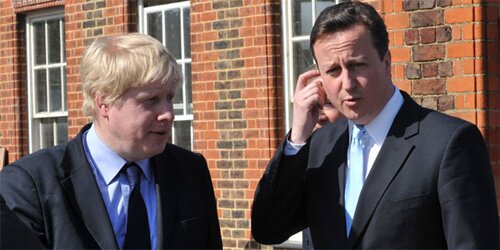A point made by Leveson at his conference that the press ignore
9:50 am - December 1st 2012
| Tweet | Share on Tumblr |
Not everyone at the Leveson Report presentation this week was taking notes. And not everyone sounding off about it was even there.
So it should surprise no-one that one or two details failed to make the newspaper coverage today, not least that the industry was so desperate to head off the potential acceptance of the recommendations by politicians that it was lobbying Leveson beyond all deadlines.
This revelation may not have been in the Executive Summary to which all media organisations have had access. But it was in Leveson’s statement: Lords Hunt and Black had presented to him a yet further revision of their “PCC 2” idea after the report had gone to the printers. There could be no other reason but to try and steal the thunder of what would be in the Report.
In any case, Leveson was clear that the Hunt and Black proposals – all of them – fell well short of what he considered acceptable. This was because what was being proposed did not give the proposed regulator independence from the press, nor the freedom from interference by proprietors and editors. Hunt and Black were still proposing that editors be allowed onto the main board of such a body.
Leveson was adamant that editors should not be allowed to influence any new regulator. This he told with no little feeling. The reason is not hard to find: when Richard Desmond pulled his titles from the PCC, it wasn’t just to save money. Indeed, being outside could make future legal actions more costly for him. There was also the presence of the legendarily foul mouthed Paul Dacre to consider.
Dacre had been equally adamant in his evidence before the Leveson Inquiry that any regulator needed editors to be part of it. Leveson showed by both the tone and content of his presentation that this had not persuaded him. Perhaps Hunt and Black will also reveal – as they seem to like giving out information – what input Dacre and his pals are providing for the so-called Free Speech Network.
What Leveson also said – and what is to no surprise also not being reported today – was that a free press was in the public interest, and that he was at all times considering the public interest. That was the first reason why he asserted that there must be legislation: the legal duty of Government to ensure press freedom, that is, free from political interference of any kind.
In doing so, Leveson was offering the press the equivalent of what in the USA is contained within the First Amendment of the Constitution. It would be a form of statute, but then, so is the US Constitution, and the latter is lauded by those across the political spectrum, especially on the right. Instead, the press is smearing and baying, its reporting selective and dismissive.
| Tweet | Share on Tumblr |  |
Tim is a regular contributor to Liberal Conspiracy. He blogs more frequently at Zelo Street
· Other posts by Tim Fenton
Story Filed Under: Blog ,Media
14 Comments || Add yours below
Reader comments
“[Leveson] asserted that there must be legislation: the legal duty of Government to ensure press freedom, that is, free from political interference of any kind.”
Freedom from political influence of the big corporations can only be secured for the press by making it a non profitmaking service to provide citizens with diverse sources of information and comment. The way forward is to turn all titles into reader-controlled co-ops, supported by a continuously redistributed levy on advertising, and to create a startup fund for new titles.
Fenton:
In doing so, Leveson was offering the press the equivalent of what in the USA is contained within the First Amendment of the Constitution. It would be a form of statute, but then, so is the US Constitution, and the latter is lauded by those across the political spectrum, especially on the right.
…unlike the Human Rights Act, which similarly guarantees freedom of expression – but which most right-wing newspapers hate (possibly because it also guarantees a right to privacy, or possibly because of its European connections).
Plus, of course, the fact that the UK still doesn’t have a written constitution.
1. domestic extremist
Freedom from political influence of the big corporations can only be secured for the press by making it a non profitmaking service to provide citizens with diverse sources of information and comment. The way forward is to turn all titles into reader-controlled co-ops, supported by a continuously redistributed levy on advertising, and to create a startup fund for new titles.
The Times, and increasingly all newspapers, is a non-profit making service. It is subsidized by Murdoch’s other interests especially in TV. In so far as it still exists it does so because of support from its readers.
So how does this differ from what you want?
The rest, I take it, is just the usual Trot whine about how your ideas are so marginal and irrelevant no one is willing to publish them.
The Inquiry was mainly about the culture of the press, which is a coded way of saying “intimidation by certain sections of the press”. It wasn’t about Milly Dowler’s phone being hacked: it was about the failure of the police to take any action even when they knew that NoTW had hacked her phone and interfered in the investigation. It wasn’t about the large-scale breaking of the law by certain newspapers and the people they had hired (some of which is now being dealt with): it was about the fact that the institutions that should have enforced the law or ensured the law was enforced (Police, Information Commissioner, PCC, politicians) felt intimidated.
Those who say that the Inquiry was not necessary (eg John Rentoul in the Independent at the weekend) have got it wrong (deliberately, I think). The answer is not that the Dowler family should be compensated and some people be put on trial. The question is: why didn’t this enforcement of the law happen until the Guardian started asking questions? Can we be sure that the law will be enforced in the future? What changes are needed to ensure that in future the press abides by its own codes and is actually prosecuted when it breaks the law? The answers to those questions has to take into account the fact that there are concentrations of media ownership, this allows certain sections of the press to create narratives that are tangential to the evidence, certain sections of the press have information about individual decision-makers that they can use as leverage, that politicians decide on policies that on the basis of what certain sections of the press will accept and not on what the public will accept or on what the evidence says, and that the press are able to intimidate or do deals with the Police and the Information Commissioner.
What we are seeing at the moment is a continuation of intimidation by the press. They want to distract attention away from certain aspects of Leveson’s report (the scale of law-breaking, the evidence of intimidation to prevent enforcement of the law and their own codes of practice). They also do not want a regulator that they cannot control. Thus the creation of a tangential narrative about freedom of the press. The Conservative Party is in no position to stand up to this intimidation: their only chance in 2015 is to get these sections of the press lined up behind them (just as they were in no position to turn down the possibility of having Coulson inside the tent pissing outwards).
It was wrong to allow Hunt and Black to make a further proposal when Leveson’s report is at the printer. It is wrong to allow the press to campaign against what is in Leveson’s report before it is published. It is wrong to allow Cameron to reject what is in the report when he said that he would accept it unless it was bonkers: he has failed to say why he thinks that the conclusions of the reoprt are bonkers. It is wrong to argue that Cameron did not really want to set up the Inquiry and to imply that somehow Cameron was tricked into setting up the Inaq
Continuation
It is wrong to argue that Cameron did not really want to set up the Inquiry and to imply that somehow Cameron was tricked into setting up the Inquiry (Rentoul’s argument in the Sunday Independent); he set up the Inquiry 16 months ago because he had to try to deal with the issues raised and an Inquiry kicked the can 16 months down the road: he is now trying to deal with the issues hoping that few people remember the context in which the Inquiry was set up. The key issue was the press’ capacity to intimidate: Cameron has demonstrated that he is still intimidated and cannot free himself of a mind-set where the tabloids set the political agenda. Reducing the capacity of certain section of the press to intimidate people requires a regulator that is independent of the editors and owners. To force the press to work with this regulator requires it to have a statutory basis. Of course certain sections of the press don’t want that: their business model is too dependent on cheaply produced sensationalism to allow a come-back by the victims of that sensationalism. So they continue to intimidate Cameron, who is too weak to realise that the tipping-point has been reached.
Guano
What an excellent analysis. It is indeed all about where power lies in the UK body politic.
Reactions: Twitter, blogs
-
Jason Brickley
A point made by Leveson at his conference that the press ignore http://t.co/yaGzTlPa
-
Alex Braithwaite
A point made by Leveson at his conference that the press ignore | Liberal Conspiracy http://t.co/Kyfh9g9U via @libcon
-
Nik
A point made by Leveson at his conference that the press ignore | Liberal Conspiracy http://t.co/Kyfh9g9U via @libcon
-
Geri
A point made by Leveson at his conference that the press ignore | Liberal Conspiracy http://t.co/Kyfh9g9U via @libcon
-
leftlinks
Liberal Conspiracy – A point made by Leveson at his conference that the press ignore http://t.co/CX5ixCfa
-
michelle maher
A point made by Leveson at his conference that the press ignore | Liberal Conspiracy http://t.co/l6nkYHe5 via @libcon
-
LeapingWeasel
A point made by Leveson at his conference that the press ignore | Liberal Conspiracy http://t.co/l6nkYHe5 via @libcon
-
Martin Grouch
A point made by #Leveson at his conference that the press ignore http://t.co/qs4xlMi5 – by @libcon
NEWS ARTICLES ARCHIVE



















